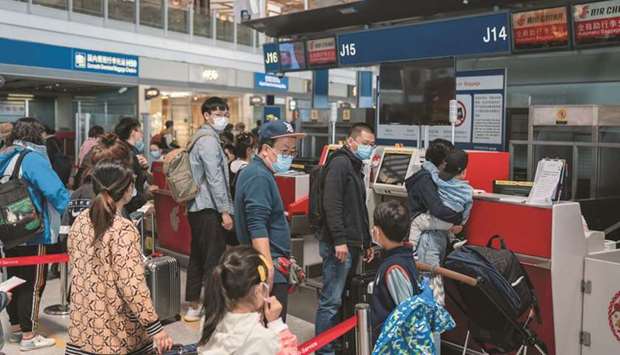Unruly passengers remain a major concern for air carriers worldwide. While serious disruptive behaviour remains rare, it can often be costly and cause aircraft delays.
Incidents involving disruptive passengers seem to have increased manifold following the Covid-19 pandemic, which forced countries around the world to enact strict laws on physical distancing and wearing masks on commercial airlines and other modes of transport.
Airlines alone have reported about 3,000 cases of unruly passengers to US aviation authorities this year as bad behaviour on flights takes off during the coronavirus pandemic.
The Federal Aviation Administration (FAA) said some 2,300 of those reports were about people who refused to wear masks. This year has also seen a record number of possible violations of the law on flights.
Passengers found guilty of unruly or dangerous behaviour can face fines or possible jail time.
The FAA said it had investigated the highest number of potential breaches of the law since records began in 1995.
The agency said some 394 cases of passengers allegedly “interfering with the duties of a crew member” had been reported as of 25 May. This, according to BBC, is twice as many as the whole of last year, when 183 cases were investigated.
“In a typical year the agency will end up taking this type of enforcement action in about 100 to 160 enforcement cases so it’s nothing new,” said Steve Dickson, FAA chief told ABC News.
“What really is new is the volume that we’re seeing right now,” Dickson noted.
Unruly passenger incidents on board aircraft in flight are a significant problem, based on statistics collected by global body of airlines IATA, together with data from civil aviation authorities and evidence from member airlines.
Unruly behaviour threatens passenger safety, disrupt other passengers and crew, causing unnecessary aircraft delays and diversions, the International Air Transport Association says.
Such incidents include violence against crew and other passengers, harassment, verbal abuse, smoking, failure to follow safety and biosafety instructions and other forms of riotous behaviour. Although such acts are committed by a tiny minority of passengers, they have a disproportionate impact. They create inconvenience, threaten the health, safety and security of other passengers and crew, and lead to significant operational disruption and costs for airlines. IATA announced changes in its reporting system to get a more accurate picture of the extent and nature of unruly passenger incidents.
However, the last full year of statistics available under the (previous) reporting system showed that in 2017 the rate was one incident for every 1,053 flights.
The top three issues were non-compliance with safety regulations, alcohol or other intoxication, and non-compliance with smoking regulations.
Between 2007 and 2016, more than 58,000 unruly passenger incidents were reported on aircraft in-flight, data available with association show.
These incidents include violence against crew and other passengers, harassment and failure to follow safety instructions.
Gaps in the Tokyo Convention 1963 (TC63), which governs offenses and certain other acts committed on aircraft means that many unruly passengers escape punishment for their misconduct.
The main issue is that the country where an aircraft is registered has jurisdiction over offences committed onboard. This causes issues when the aircraft is away from its country of registration because the local police do not have jurisdiction to deal with the incident and unruly passengers are often released without charge.
IATA member airlines state this is the reason for prosecutions not proceeding in around 60% of unruly passenger cases. To address this, IATA lobbied effectively for the International Civil Aviation Organisation (ICAO) to conduct a thorough review of TC63 in 2009. Countries agreed that amendments were needed, and this resulted in the Montreal Protocol 2014 (MP14). MP14 entered into force in January 2020, following ratification by some 22 ICAO Member States.
But the job is not done. More countries need to ratify MP14 so that unruly passengers can be prosecuted according to uniform global guidelines.
Countries should also review the effectiveness of the enforcement mechanisms available to them in line with ICAO Guidance on Legal Aspects of Unruly and Disruptive Passengers, which gives information on how civil and administrative fines and penalties can be used to supplement criminal prosecutions.
In addition to strengthening jurisdiction and enforcement, airlines are working on a range of measures to help prevent incidents and manage them more effectively when they do happen.
These include enhanced crew training and raising awareness with passengers of the potential consequences of unruly behaviour on board.
* Pratap John is Business Editor at Gulf Times. Twitter handle: @PratapJohn

Travellers line up at Air China counters at Beijing Capital International Airport. Unruly passengers remain a major concern for air carriers worldwide. While serious disruptive behaviour remains rare, it can often be costly and cause aircraft delays.
